Cet article a été écrit par mon pote Thibaut de qui vit et organise des voyages au Bénin. Je l’ai rencontré lors de la préparation de mon voyage à moto au Togo.
Thibaut est un français passionné par l’Afrique de l’ouest et marié à une Béninoise. Depuis 8 ans il partage sa vie, entre la France et le Bénin où il organise des voyages à travers le pays et des safaris dans le parc de la Pendjari. Mais c’est avant tout un amoureux du voyage qui adore parler, échanger et partager son savoir sur son pays d’adoption.
Depuis que je l’ai rencontré, on a passé des heures à parler de l’Afrique de l’ouest et du Bénin en particulier. Je lui ai donc proposé d’écrire un article sur son pays d’adoption.
Sommaire
- 1 Ai-je besoin d’un visa ?
- 2 Quel est le prix du billet d’avion ?
- 3 Comment quitter l’aéroport ?
- 4 Quelle est la monnaie ? Comment faire le change ?
- 5 Quelle langue parle-t-on ?
- 6 Quelles sont les phrases de bases à connaître ?
- 7 Dois-je acheter une carte sim ?
- 8 Comment est la police ?
- 9 Quels sont les moyens de transport ?
- 10 Quel itinéraire pour un séjour au Bénin ?
- 11 Peut-on faire un safari au Bénin ?
- 12 Peut-on faire un safari pour pas cher dans le parc de la Pendjari ?
- 13 Peut on faire du camping dans le parc de la Pendjari ?
- 14 Où puis-je loger ? As-tu des hôtels à recommander ?
- 15 Où me nourrir ?
- 16 Trouve-t-on facilement de l’eau ?
- 17 Comment rester en bonne santé ?
- 18 Dois je souscrire une assurance voyage ?
- 19 Que prendre dans mon sac ?
- 20 Quels sont les indispensables à emmener au Bénin ?
- 21 Peut-on voyager avec un budget routard ?
- 22 Comment sont les gens ?
- 23 A quelle période aller au Bénin ?
Ai-je besoin d’un visa ?
Oui, il faut un visa pour voyager au Bénin, mais c’est aujourd’hui très simple: les démarches se font directement sur Internet.
Il faut simplement remplir un formulaire, payer en ligne et imprimer le visa.
Le prix est de 50 € pour un visa d’1 mois.
On va te demander une adresse au Bénin. Pas de souci, prends simplement l’adresse de n’importe quel hôtel. Tu trouveras toutes les infos nécessaires sur ce site:https://evisa.gouv.bj/fr/
Quel est le prix du billet d’avion ?
Tu peux facilement en trouver à partir de 400 € l’aller-retour.
Air France, Air Burkina, Brussels airlines et Royal Air Maroc sont les principales compagnies qui desservent le Bénin.
Je te conseille de lire l’article de Georges-Michel qui t’explique comment trouver un billet d’avion pas cher.
Comment quitter l’aéroport ?
Pour quitter l’aéroport c’est très simple il y a :
des taxis voiture,
soit si tu n’es pas trop chargé des taxis moto.
Il faut toujours que tu négocies le montant de la course avant de rentrer dans le véhicule, pour ne pas te faire arnaquer par les taxis.
Depuis peu, un service de taxi nommé taxi Bénin a été mis en place. Ils sont faciles à repérer ce sont des Dacia deuster jaunes.
Le tarif est fixe en fonction de la course.
Compte en général entre 1500 frs CFA et 5000 frs CFA (entre 2 et 8 euros) la course selon la destination.
Quelle est la monnaie ? Comment faire le change ?
La monnaie est le frs CFA qui a un taux fixe de 655, 957 Francs pour 1 €.
Tu peux changer des euros dans n’importe quelle banque. Par contre, il est préférable que tu ailles dans des bureaux de change officiels car tu peux avoir un taux encore plus intéressant, notamment si tu as des coupures de 100€ ou 200 €.
Tu trouveras aussi un bureau de change à l’aéroport de Cotonou ouvert jusqu’à 22h mais le taux de change est moins intéressant. Ce bureau peut te dépanner pour pouvoir avoir tes premiers francs CFA à ton arrivée.
Quelle langue parle-t-on ?
La langue officielle est le français ce qui est très pratique car tu peux te faire comprendre à peu près partout.
La langue d’usage est le fon dans le sud du pays et la plupart des gens parlent cette langue entre eux. Mais sache qu’il y a près de 60 langues dans le pays.
Dans le nord du pays il y a tellement de dialectes que la plupart du temps les gens parlent français entre eux, ce qui est plus facile pour comprendre les conversations.
Quelles sont les phrases de bases à connaître ?
Si tu veux communiquer un minimum avec les locaux, tu peux apprendre facilement ces quelques phrases.
Pour échanger en Fon, dans le sud, tu peux apprendre:
Bonjour – Afon a
Comment vas-tu ? – Ning afong bon ?
Merci – Awanou
Au Revoir – Odabo
Quel est ton nom ? – Nin anongnin ?
J’ai soif – Singla sin mi
Bonjour – Nassuba
Comment ça va ? – Mété ga
Merci – Nakbé
Le Blanc – Batouré
Dois-je acheter une carte sim ?
Oui, une carte SIM locale coûte au maximum 1, 50 €.
Le crédit peut te servir soit pour les appels soit pour la connexion internet.
Le tarif de la communication est d’environ 10 centimes d’euro la minute.
Pour la connexion internet les prix fluctuent souvent et l’on trouve une multitude de petits forfaits. Il y a même un forfait illimité à 25 € pour un mois de connexion internet.
Il existe aussi un forfait de 1 go valable 48 h à 500 frs CFA (75cent d’euros) qui est très pratique.
Le réseau qui dispose de la plus grande couverture nationale est MTN et globalement cela fonctionne bien partout.
Comment est la police ?
La police au Bénin est tout à fait correcte et personnellement je n’ai jamais eu de soucis avec eux. Cependant en cas d’infraction il est en général préférable d’essayer de s’arranger avec le policier directement. Sinon tu devras aller au commissariat et cela te prendra beaucoup plus de temps.

Quels sont les moyens de transport ?
Le moyen de transport le plus utilisé et le plus pratique en ville est le taxi moto. Tu trouveras des taxis à peu près partout et il faut négocier la course avant de monter sur la moto. Pour une course en ville compte entre 50 centime d’euro et 1, 50 € selon la distance.
Entre les villes, tu peux utiliser des bus ou des taxis brousse. Les bus sont plus sécurisants que les taxis brousse.
Quelques distances depuis Cotonou:
Porto Novo: 30 km
Ouidah: 40 km
Abomey: 140 km
Parakou: 420 km
Natitingou: 550 km
Malanville: 740 km
Les transports ne sont pas chers du tout. Par exemple un Cotonou-Natingou coûte 9 000 frs CFA soit 14€, un Cotonou-Malanville coûte 12 000 frs CFA soit 18€.
Tout comme Georges-Michel, j’adore voyager à moto. C’est un moyen de transport qui permet de se sentir libre et d’aller partout où tu le souhaites, rencontrer qui tu veux. A ce sujet je t’invite à lire son article très complet sur le voyage à moto au Togo et au Bénin.
Je dispose moi-même de Motos à louer dans le sud du Bénin, n’hésite pas à me contacter.
Quel itinéraire pour un séjour au Bénin ?
Les principales villes intéressantes à visiter sont les suivantes: Ouidah, Cotonou, Grande popo, Porto-Novo, Adjarra, Abomey, Dassa, Natitingou, Boukoumbe et le Parc de la Penjari.
Dans ces différents endroits, voici mes coups de coeur :
Porto-Novo:
Je t’invite à découvrir le centre culturel Ouadada. C’est un lieu de diffusion culturelle où tu trouveras diverses oeuvres, de différents artistes plasticiens, mais c’est aussi un lieu ressource pour partir à la découverte de la ville et des différentes places vaudoues qui la composent. Ils proposent des guides particulièrement compétents et intéressants qui te permettront d’appréhender la culture vaudoue.N’hésite pas, à passer au Jardin des plantes où tu pourras observer différentes sortes d’arbres et de plantes mais aussi quelques singes dans les arbres du parc.Je te conseille aussi, de visiter dans le quartier acron, la grande mosquée aux multiples couleurs et d’aller faire un tour au marché des plantes médicinales unique en son genre.Abomey:Le musée Honme te permet une découverte de toute l’histoire des rois d’Abomey. La visite du centre des artisans qui se situe dans une des cours du palais est également très intéressante.
Vous pouvez visionner ce petit reportage sur lui ici:
https://youtu.be/_uIHPMCfLvc
Dassa:
Cette région est particulièrement magnifique avec ses grandes collines et ses grosses pierres un peu partout. Il est intéressant d’aller dans un petit village après Sokponta qui se nomme Camaté. C’est un village typique, au pied des collines, où l’on te réserve toujours un accueil bienveillant. Tu pourras facilement monter sur les collines et trouver des guides locaux sur place pour te guider.
Mon conseil :
Demande à rencontrer Augustin, un sage philosophe ancien pilote de ligne, venu passer sa retraite dans son village d’origine. C’est une personne étonnante et passionnante. Passe-lui le bonjour de ma part.
Boukoumbe :
De plus, le restaurant géré par sa fille est la meilleure table de Boukoumbé et l’un des rares endroits où l’on trouve également des plats végétariens.
Tanaugou:
Ce petit village à deux pas du parc de la Pendjari est particulièrement sympa pour l’accueil de ses habitants. Les traditions sont toujours présentes et il est fréquent de se retrouver au milieu de cérémonies diverses quand on passe la nuit dans ce village.
Diverses randonnées te sont aussi proposées et c’est passionnant de partir marcher dans la brousse à la découverte de végétation et d’arbres fruitiers totalement inconnu dans nos contrées occidentales.
Taneka beri:
Ne manque pas de visiter ce village tout à fait typique qui se trouve perché au sommet d’une colline. La vue est particulièrement splendide.
Petit plus:
Le village se situe à quelques kilomètres de Copargo petite ville entre Djougou et Natitingou.
Posotome :
L’association eco-Benin te propose diverses sorties entre nature et culture à tester absolument. Tu pourras par exemple partir en pirogue à la découverte des techniques traditionnelles de pêche ou apprendre la phytothérapie en baladant dans le village.Grand Popo:Cette station balnéaire était un haut lieu du commerce auparavant. Aujourd’hui tu peux profiter des grandes plages de sable blanc ainsi que des divers bars et restaurants qui se trouvent le long de la plage. N’hésite pas à aller en pirogue aux bouches du roi, lieu de l’embouchure entre le fleuve mono et l’océan ainsi qu’à découvrir les mangroves et les diverses îles autour de la lagune.
Au niveau hébergement je te conseille Coco Beach, chez Mathias si tu aimes l’ambiance roots, les pieds dans le sable.
Cotonou:
Bien sur la route des pêches et les plages sont sympas pour se détendre et profiter de l’océan.
Dans le quartier fidjrossé, de nombreux bars restos avec des programmations musicales diverses et variées ont fait leur apparition ces derniers temps. Pense à aller faire un tour par exemple au jammin, au lieu unique, au jababa ou au parking bar pour ne cité qu’eux.
Peut-on faire un safari au Bénin ?
Oui, tu peux faire un safari au Bénin. C’est une expérience magnifique car c’est un pays encore preservé du tourisme de masse. Le parc de la Pendjari est l’endroit idéal pour faire un safari dans un cadre naturel où les animaux sont rois.
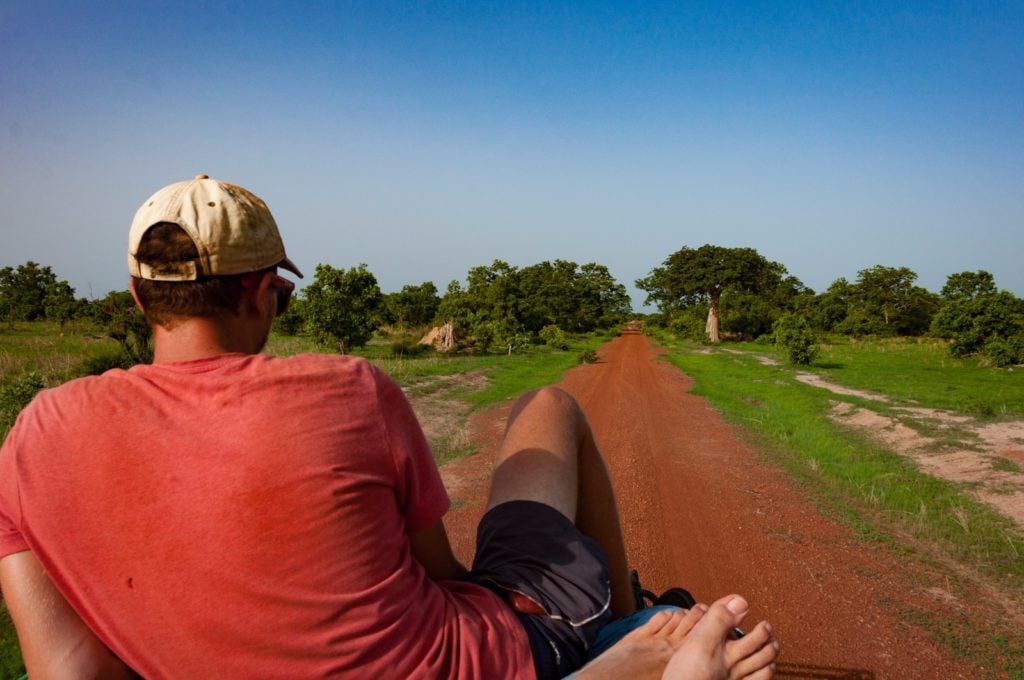
C’est un lieu très sauvage qio s’étend sur 460 km2.
Il est encore très peu fréquenté puisqu’il y a aux alentours de 7 000 visiteurs par an, soit en moyenne 24 personnes par jour, tu visualises mieux l’authenticité des lieux.
En comparaison, le parc de Kruger en Afrique du sud accueille 1,4 millions de visiteurs par an.
Tu peux y rencontrer, toute sorte d’animaux:
- éléphants,
- lions,
- hyènes,
- hippopotames,
- crocodiles,
- guépards,
- différentes sortes de singes,
- et plus de 4000 espèces d’oiseaux.
Il s’agit de la plus grande réserve de biosphère de l’Ouest africain.

Peut-on faire un safari pour pas cher dans le parc de la Pendjari ?
L’entrée du parc de la Pendjari et à 15 € par jour et par personne.
Cependant l’essentiel du coût d’une visite du parc réside dans la location du 4*4 avec un chauffeur guide obligatoire. Compte environ 120 € par jour essence et guidage compris. Ce tarif est bien sûr à diviser par le nombre de passagers.
N’hésite pas à contacter Thibault via le formulaire ci dessous. Il a souvent des personnes qui vont visiter le parc et il peut t’aider à rencontrer d’autres voyageurs afin de diviser les frais.
Peut on faire du camping dans le parc de la Pendjari ?
Oui, le parc dispose de 3 airs de campings au milieu de la Savane. Il n’y a aucun équiment, tu devras donc prévoir le nécessaire. Le tarif est de 3 000 frs CFA par personne.
Où puis-je loger ? As-tu des hôtels à recommander ?
On trouve des hôtels bon marché un peu partout au Bénin. Il faut compter entre 8 € et 25 € une chambre ventilée et une chambre climatisée à partir de 20 € environ. Les prix varient énormément selon la localisation et la qualité de l’hôtel.
Sur Cotonou je te conseille le Tichani Club car c’est une ambiance comme à la maison avec de belles chambres ventilées à 16 € ou climatisées à 25 €. Il est au bord de la mer dans le quartier fidjurossé et il y a une belle terrasse. L’accueil est très sympathique ainsi que le jardin ombragé.
Sinon tu peux également trouver des logements sur airbnb, n’hésite pas à utiliser les techniques de Georges-Michel pour obtenir des réductions.
Où me nourrir ?
On trouve de la nourriture un peu partout au Bénin. Que ce soit au bord des routes avec des mamans qui préparent à manger, dans des petits maquis ou encore dans des restaurants plus traditionnels.
Un hamburger par exemple coute aux alentours de 3 € en ville. Plus simplement on peut manger du riz avec un morceau de viande pour moins d’un euros 50.
Les prix de la nourriture dépendent plus du cadre dans lequels on les achète que de la nourriture en elle-même. Le même plat africain par exemple peut vous être facturé 7 € dans un hôtel et 1 € au bord de la route. Personnellement, je mange partout et je n’ai jamais eu aucun souci de santé. Il faut simplement éviter les légumes crus dans les zones où l’on n’est pas sûr qu’ils aient été lavés avec de l’eau potable mais sinon avec les plats chauds tu ne risques pas grand-chose.
Trouve-t-on facilement de l’eau ?
L’eau du robinet est tout à fait potable tout du moins dans les principales villes. La plupart des expatriés la boivent d’ailleurs. Cependant par prudence ou si ton estomac est particulièrement fragile il est préférable de prendre de l’eau en bouteille ou de mettre des micropurs dans l’eau du robinet.
On trouve des bouteilles d’eau un peu partout et cela coute 75 centimes d’euro la bouteille d’un litre et demi. Le plus économique est donc d’acheter des micropur avant de venir et d’en mettre dans l’eau du robinet.
Tu trouveras un peu partout des sachets d’eau appeler pure water, il faut savoir que c’est simplement l’eau du robinet qui est mise en sachet.
Comment rester en bonne santé ?
Le vaccin contre la fièvre jaune est obligatoire.
Le paludisme est très présent. Prends de la Malarone durant tout ton séjour. En région parisienne la pharmacie Zemiro vend le paquet de Malarone à 6,5 € (les prix sont libres, selon la pharmacie le paquet peut atteindre 45€).
Vu le prix et le risque encouru, il est important d’en prendre. Porte toujours un pantalon, une chemise manche longue et de l’antimoustique le soir pour limiter les piqûres.
Enfin si tu vas dans les villages ou que tu comptes boire l’eau des forages, il faut la purifier avec une pastille micropur. Purifie toujours l’eau du robinet pour pas être malade.
L’autre risque est la rage, mais comme dans n’importe quel pays, évite de caresser les animaux errants.
Dois je souscrire une assurance voyage ?
Oui, tu ne sais pas ce qui peut t’arriver et même au fin fond de l’Afrique, ton assureur viendra te chercher. Georges-Michel en a fait l’expérience aprés son accident de moto au Togo. Il a d’ailleurs pu en tirer un article très complet au sujet des assurances voyages des cartes bancaires.
Vérifie bien tes garanties offertes par ta carte bancaire et si n’est pas bien couvert, soucrit une assurance spécifique.
Que prendre dans mon sac ?
Je te conseille de voyager léger, que ton sac ne dépasse pas les 8 kg.
Arrange pour pouvoir garder ton sac à dos en cabine. Cela te force à ce qu’il ne soit pas trop lourd. Ça t’évite d’avoir à l’attendre une fois arrivé à l’aéroport et surtout, ça évite à la compagnie de le perdre durant l’escale.
N’emporte pas de vêtements pour plus que 5 jours, je pense que c’est le compromis idéal pour profiter de son voyage tout en s’arrêtant et en prenant du temps pour soi.
Voici le contenu idéal pour ton sac.
- sac à dos avec une poche à eau
- pantalon léger
- pantalon de jogging
- short de bain
- 10 caleçons
- 8 paires de chaussettes
- 3 chemises décathlon
- t shirts
- cadenas
- lampe frontale
- sweat à capuche
- sac étanche
- Brosse à dents
- dentifrice
- adapter USB courant
- Bob
- lunettes de soleil
- paire de lunettes de vue de rechange
- serviette microfibre
- tente et un matelas ultra léger
- boite de micropur
Quels sont les indispensables à emmener au Bénin ?
Le petit futé Bénin : C’est un guide complet avec plein d’informations intéressantes sur l’histoire et la culture du pays. Il y a de très bons plans pour trouver des logements dans tous les coins du pays.
Une ceinture cache billet: Je voyage toujours avec, c’est une ceinture qui a l’air normale mais elle permet de cacher 20 billets à l’intérieur. C’est le meilleur moyen de dissimuler ton argent.
Une serviette microfibre : Les serviettes microfibre séches ultra rapidement, elles sont petites, légères et ultra-absorbantes. C’est beaucoup plus sain pour la peau que les serviettes prêtées dans les auberges.
Un Hamac : Depuis quelques temps je voyage toujours avec mon hamac. C’est très pratique, ça se transporte facilement et ça permet de dormir ou de faire une sieste n’importe où. Le mien est équipé d’une moustiquaire pour être vraiment tranquille.
Une boite de micropur: Pour purifier l’eau claire. En montagne, les campements de yourtes se font chez des éleveurs. Les cours d’eau sont bordés d’animaux et sont souillés de déjections. Même si l’eau est claire, tu dois la purifier pour ne pas tomber malade. Une boite de micropur réduira aussi ton budget eau. Une bouteille d’eau coûte 1€, tandis qu’une pastille de micropur te revient à 18 centimes.
Peut-on voyager avec un budget routard ?
Oui, tu peux très simplement voyager en mode routard, soit en baladant d’une ville à une autre en taxi brousse soit en louant une moto ce qui confère quand même beaucoup plus de liberté. Ce qui est particulièrement pratique également c’est que l’on peut mettre la moto dans les bus pour les grands trajets entre le sud et le nord par exemple. Le plus confortable étant bien sûr de louer une voiture mais c’est nettement plus cher.
Il faut compter 15 € par jour environ pour une petite 125 cm3 et 75 € par jour environ pour un véhicule avec chauffeur.
Comment sont les gens ?
Les gens au Bénin sont particulièrement accueillant et sympathique. Un peu partout les gens sont curieux de te connaître et c’est très agréable de pouvoir discuter avec la population.
La plupart des contacts humains sont déintéressés même si cela arrive quelquefois que l’on vous demande de faire un cadeau ou un peu d’argent.
J’ai toujours trouvé les gens très bienveillants à mon égard. Plusieurs fois par exemple que ce soit dans un village ou en pleine ville j’ai oublié mon casque et à chaque fois la personne chez qui je l’avais oublié s’est mit à courir derrière moi pour me le ramener.
A quelle période aller au Bénin ?
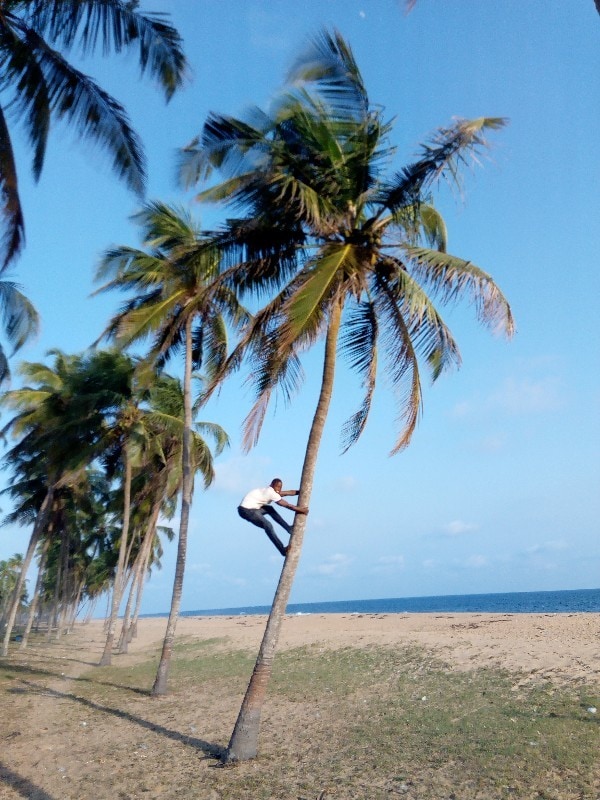
Il fait environ 32 degrés toute l’année à Cotonou.
La saison sèche s’étend de décembre à avril mais en dehors de cette période même s’il y a quelques pluies ce n’est pas pour autant désagréable de passer du temps au Bénin. Parfois c’est même mieux car cela rafraîchit l’atmosphère et cela crée un paysage encore plus verdoyant notamment au nord. À savoir simplement que le parc de la Pendjari est fermé 2 mois et demi du 1er août au 15 octobre.
Au plaisir de te croiser au Bénin.
J’espère que cet article t’as bien aidé. Merci à Thibaut d’avoir partagé toutes ces infos.
Si tu veux le joindre pour organiser ton voyage tu peux le contacter via ce formulaire.
N’hésite pas à laisser toutes tes questions et tes infos en commentaire pour compléter l’article.


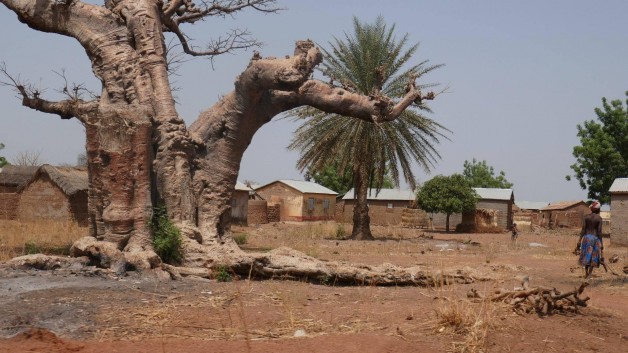
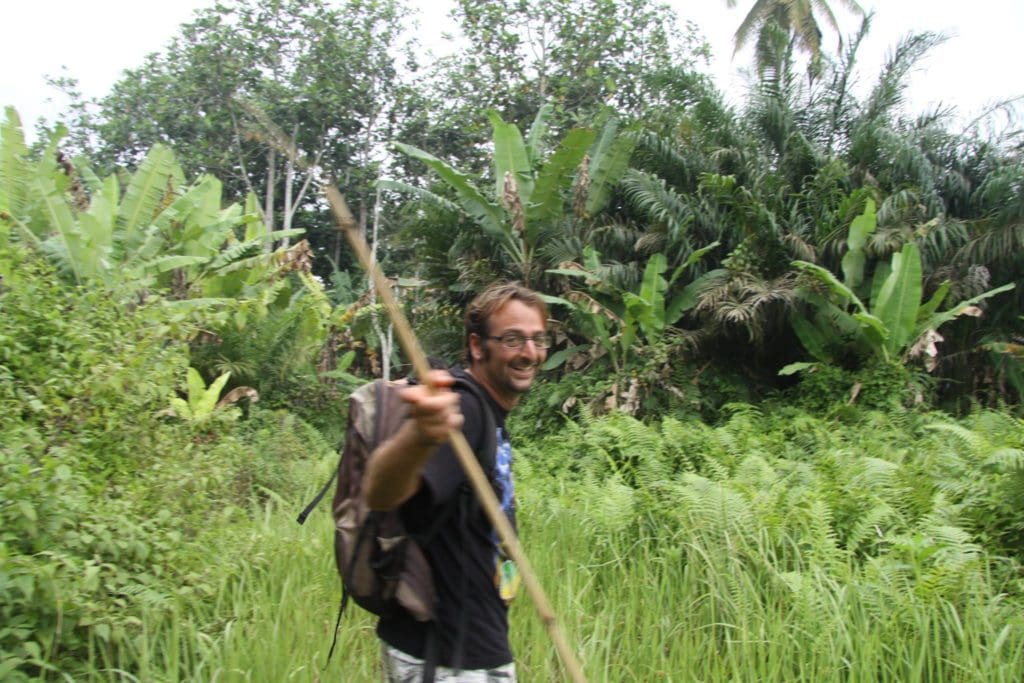
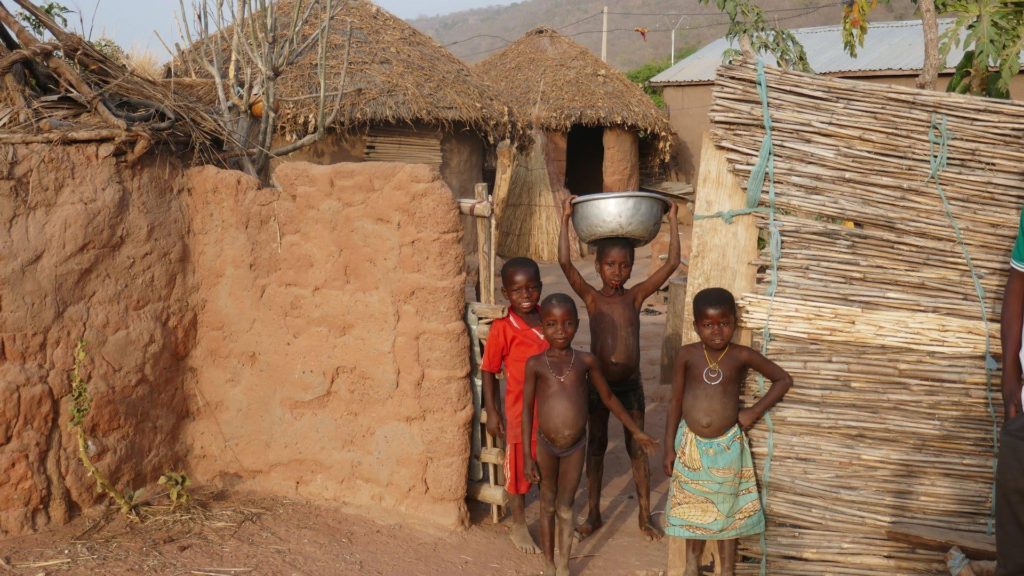
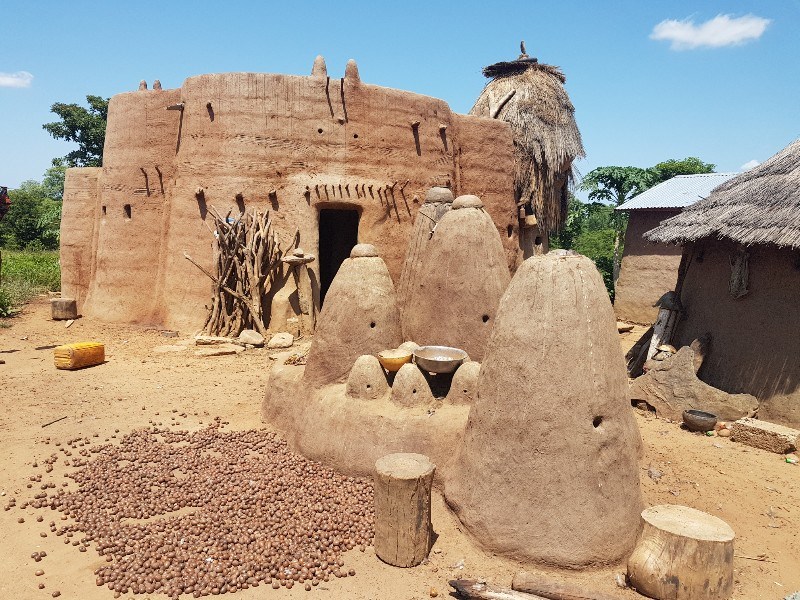
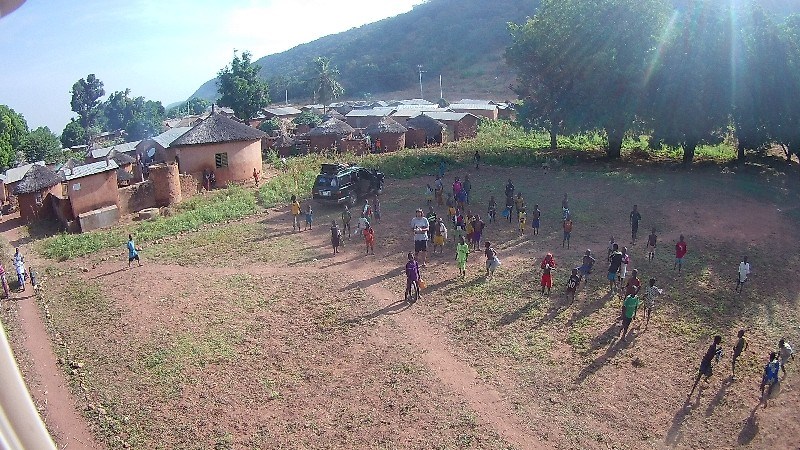
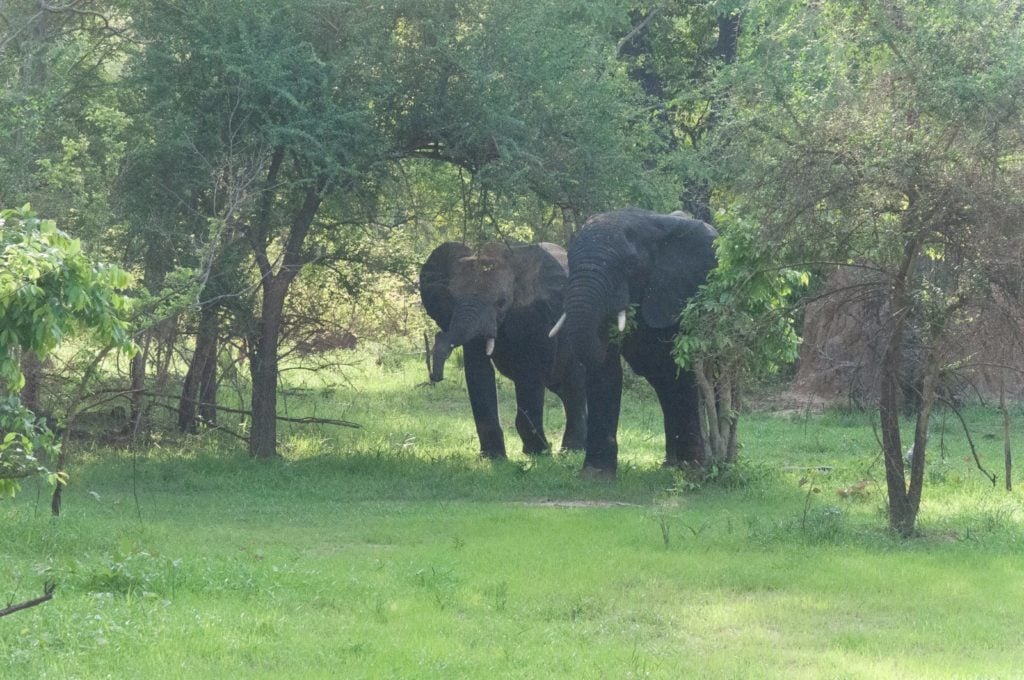
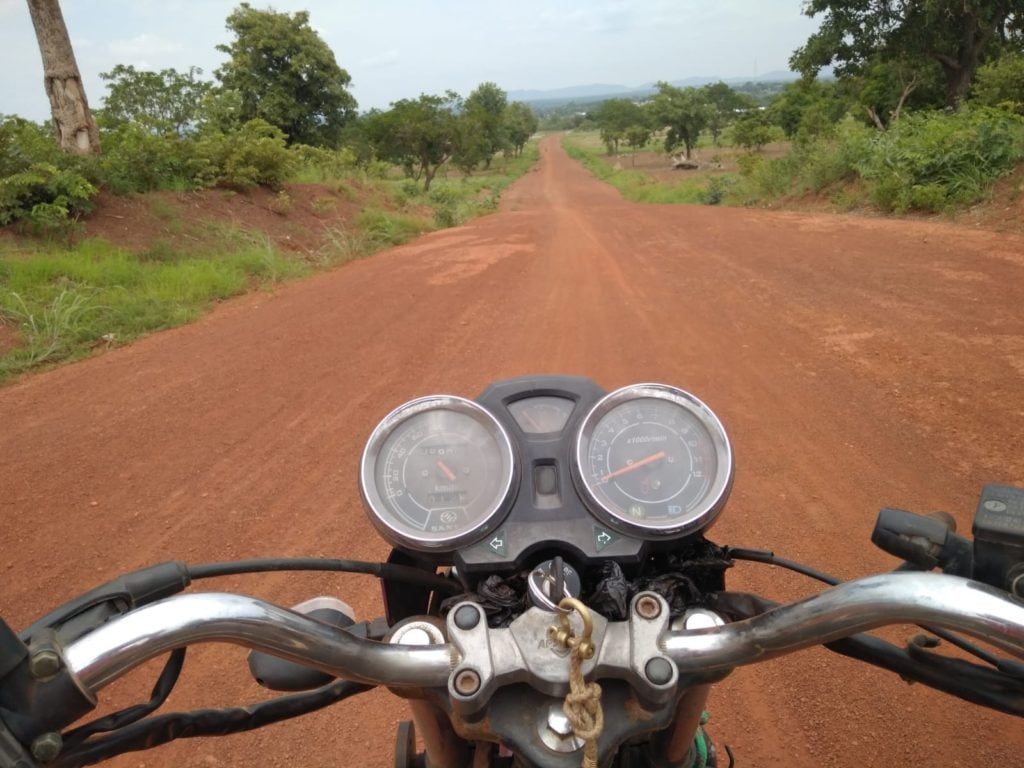
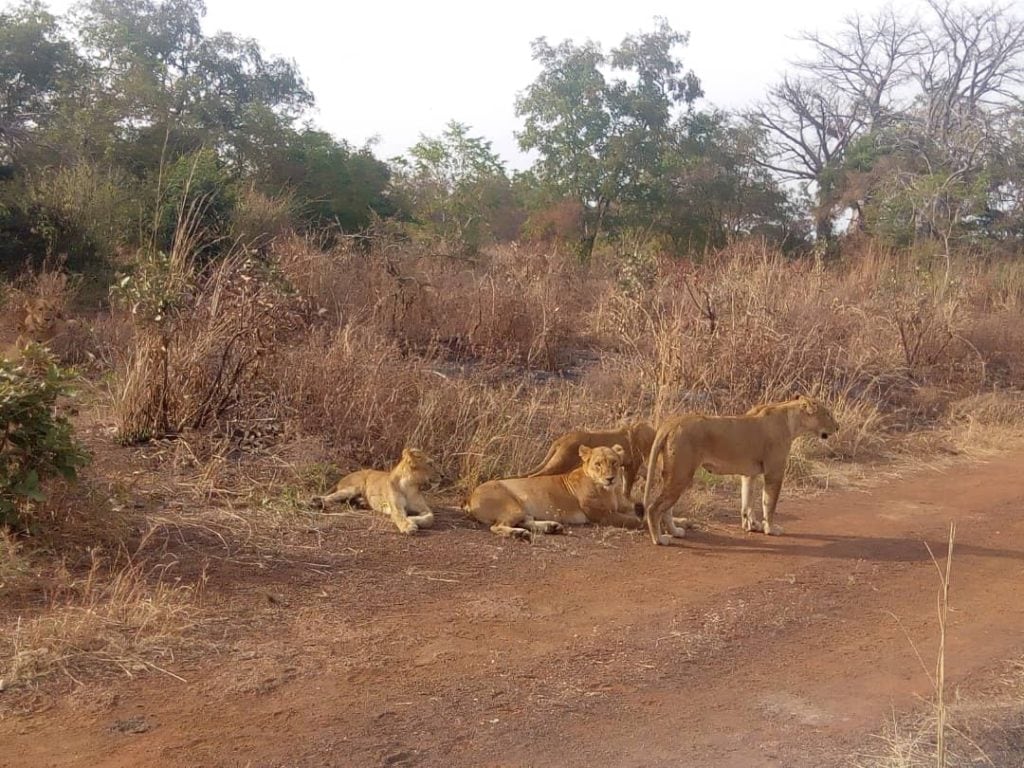
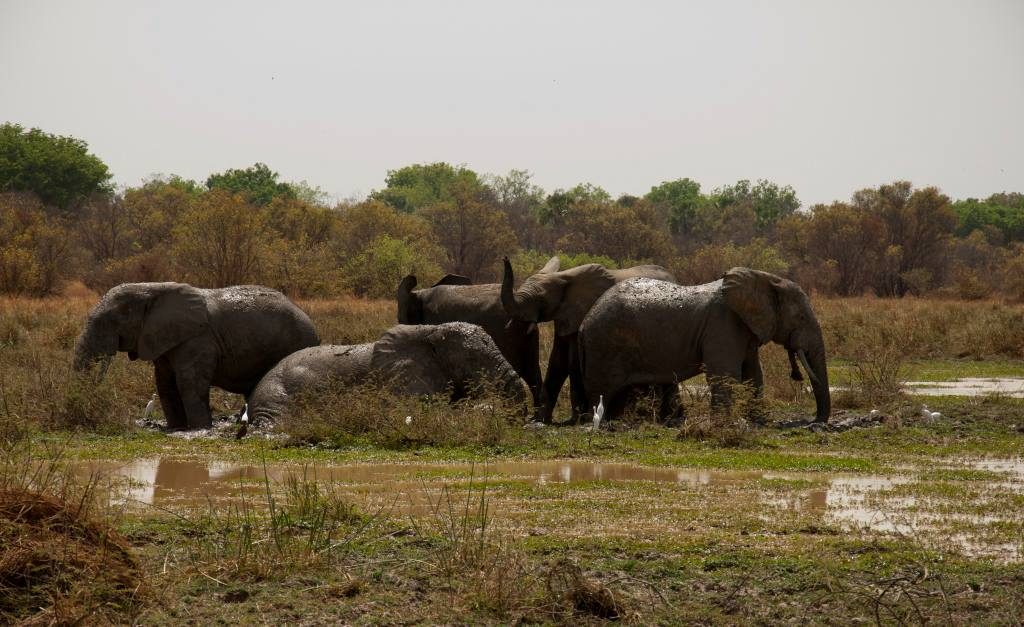
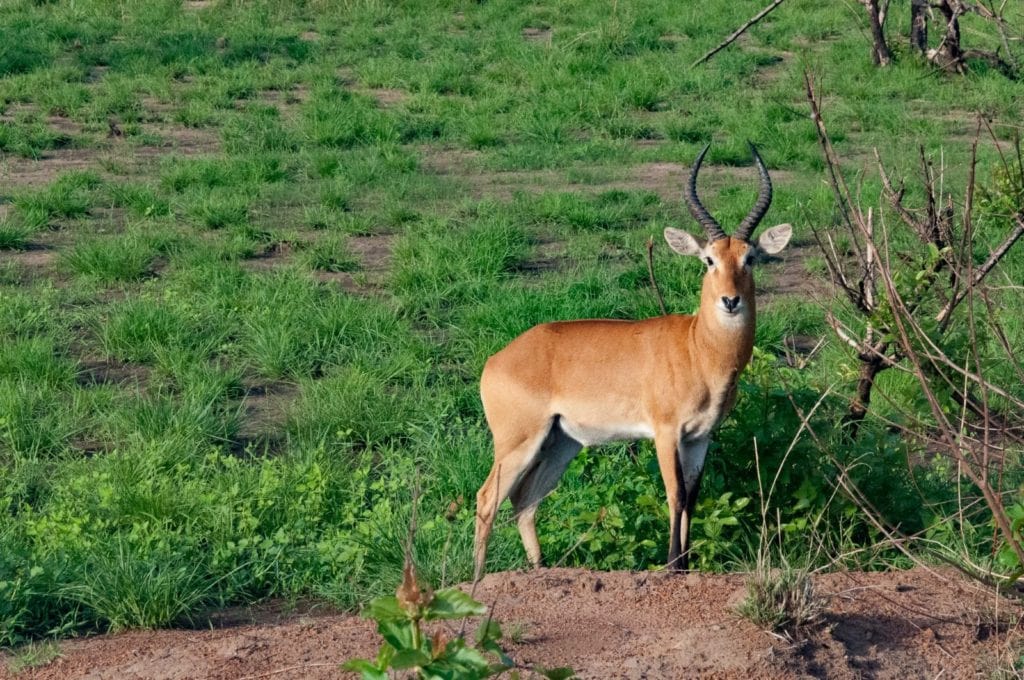
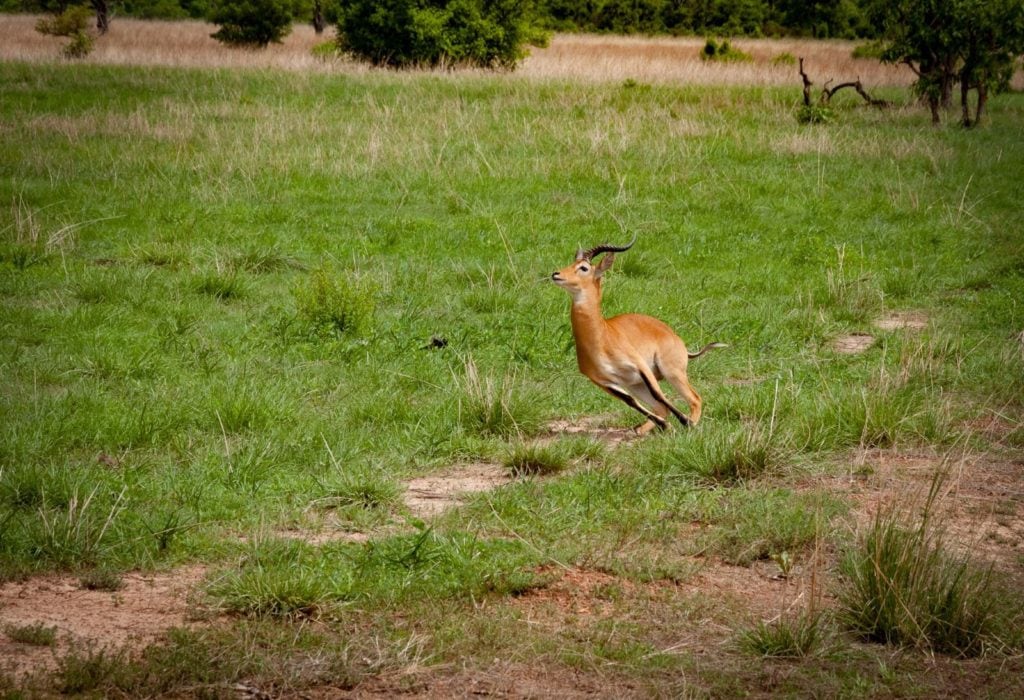
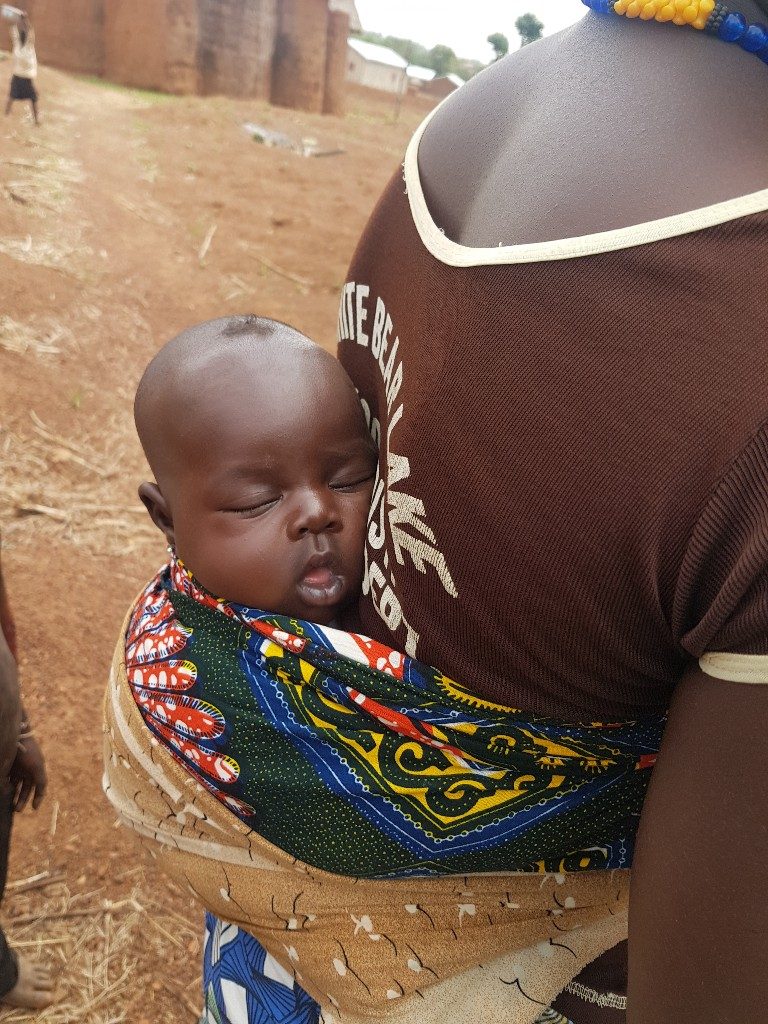
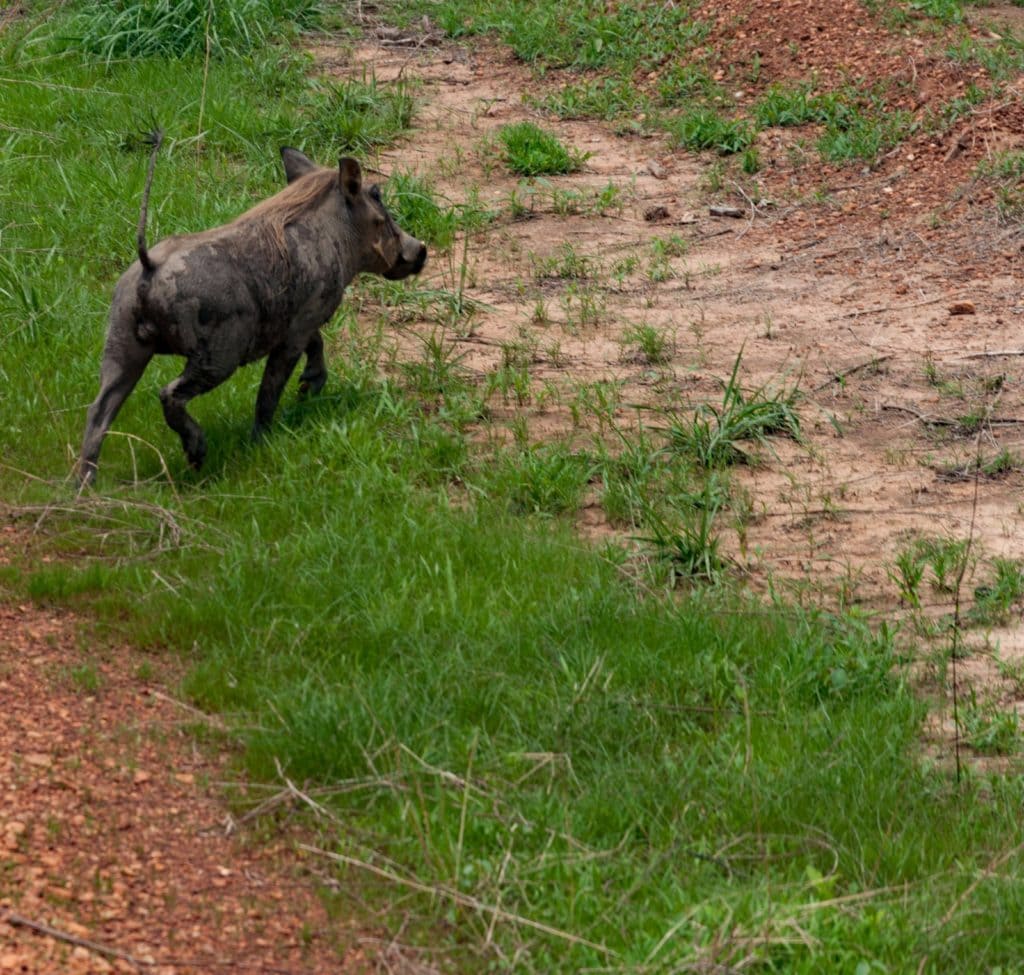
Je suis allée au Bénin et j’ai adoré! Il y a énormément de sites historiques à visiter, la culture et les arts sont présents partout et la faune et la flore sont juste magnifiques. Les gens sont très accueillants. Je recommande chaudement ce voyage! En plus j’ai eu la chance de rencontrer Thibaut qui nous a concocté un super voyage pour les vieilles tatas que nous sommes !
Merci Marisol.